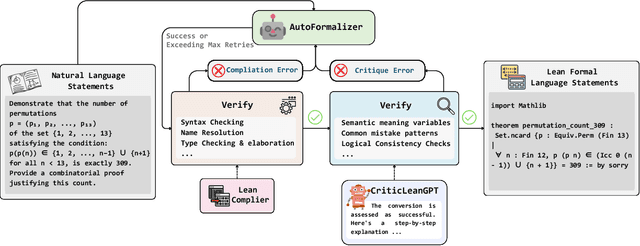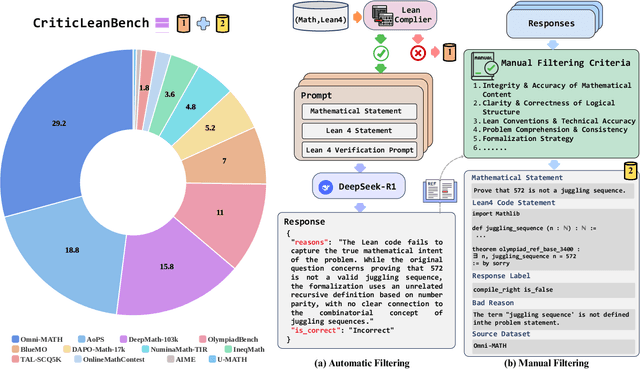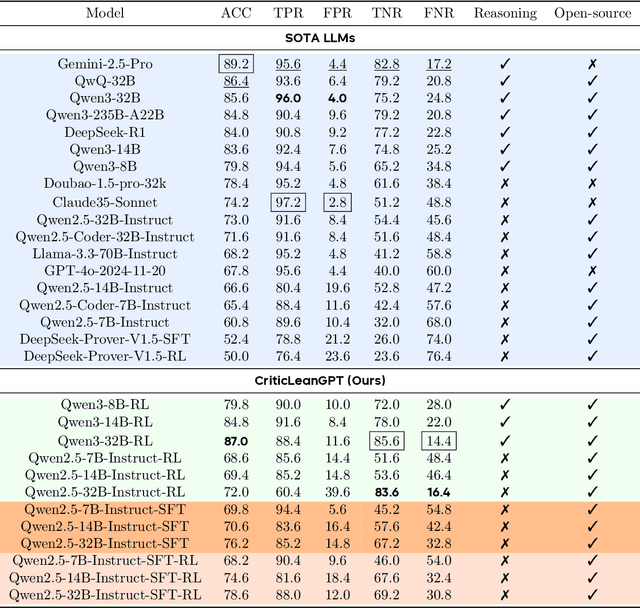Chenchen Zhang
NL2Repo-Bench: Towards Long-Horizon Repository Generation Evaluation of Coding Agents
Dec 14, 2025Abstract:Recent advances in coding agents suggest rapid progress toward autonomous software development, yet existing benchmarks fail to rigorously evaluate the long-horizon capabilities required to build complete software systems. Most prior evaluations focus on localized code generation, scaffolded completion, or short-term repair tasks, leaving open the question of whether agents can sustain coherent reasoning, planning, and execution over the extended horizons demanded by real-world repository construction. To address this gap, we present NL2Repo Bench, a benchmark explicitly designed to evaluate the long-horizon repository generation ability of coding agents. Given only a single natural-language requirements document and an empty workspace, agents must autonomously design the architecture, manage dependencies, implement multi-module logic, and produce a fully installable Python library. Our experiments across state-of-the-art open- and closed-source models reveal that long-horizon repository generation remains largely unsolved: even the strongest agents achieve below 40% average test pass rates and rarely complete an entire repository correctly. Detailed analysis uncovers fundamental long-horizon failure modes, including premature termination, loss of global coherence, fragile cross-file dependencies, and inadequate planning over hundreds of interaction steps. NL2Repo Bench establishes a rigorous, verifiable testbed for measuring sustained agentic competence and highlights long-horizon reasoning as a central bottleneck for the next generation of autonomous coding agents.
SWE-Compass: Towards Unified Evaluation of Agentic Coding Abilities for Large Language Models
Nov 07, 2025Abstract:Evaluating large language models (LLMs) for software engineering has been limited by narrow task coverage, language bias, and insufficient alignment with real-world developer workflows. Existing benchmarks often focus on algorithmic problems or Python-centric bug fixing, leaving critical dimensions of software engineering underexplored. To address these gaps, we introduce SWE-Compass1, a comprehensive benchmark that unifies heterogeneous code-related evaluations into a structured and production-aligned framework. SWE-Compass spans 8 task types, 8 programming scenarios, and 10 programming languages, with 2000 high-quality instances curated from authentic GitHub pull requests and refined through systematic filtering and validation. We benchmark ten state-of-the-art LLMs under two agentic frameworks, SWE-Agent and Claude Code, revealing a clear hierarchy of difficulty across task types, languages, and scenarios. Moreover, by aligning evaluation with real-world developer practices, SWE-Compass provides a rigorous and reproducible foundation for diagnosing and advancing agentic coding capabilities in large language models.
AutoCodeBench: Large Language Models are Automatic Code Benchmark Generators
Aug 12, 2025



Abstract:Large Language Models (LLMs) have demonstrated remarkable capabilities across various domains, with code generation emerging as a key area of focus. While numerous benchmarks have been proposed to evaluate their code generation abilities, these benchmarks face several critical limitations. First, they often rely on manual annotations, which are time-consuming and difficult to scale across different programming languages and problem complexities. Second, most existing benchmarks focus primarily on Python, while the few multilingual benchmarks suffer from limited difficulty and uneven language distribution. To address these challenges, we propose AutoCodeGen, an automated method for generating high-difficulty multilingual code generation datasets without manual annotations. AutoCodeGen ensures the correctness and completeness of test cases by generating test inputs with LLMs and obtaining test outputs through a multilingual sandbox, while achieving high data quality through reverse-order problem generation and multiple filtering steps. Using this novel method, we introduce AutoCodeBench, a large-scale code generation benchmark comprising 3,920 problems evenly distributed across 20 programming languages. It is specifically designed to evaluate LLMs on challenging, diverse, and practical multilingual tasks. We evaluate over 30 leading open-source and proprietary LLMs on AutoCodeBench and its simplified version AutoCodeBench-Lite. The results show that even the most advanced LLMs struggle with the complexity, diversity, and multilingual nature of these tasks. Besides, we introduce AutoCodeBench-Complete, specifically designed for base models to assess their few-shot code generation capabilities. We hope the AutoCodeBench series will serve as a valuable resource and inspire the community to focus on more challenging and practical multilingual code generation scenarios.
Adaptive Termination for Multi-round Parallel Reasoning: An Universal Semantic Entropy-Guided Framework
Jul 09, 2025Abstract:Recent advances in large language models (LLMs) have accelerated progress toward artificial general intelligence, with inference-time scaling emerging as a key technique. Contemporary approaches leverage either sequential reasoning (iteratively extending chains of thought) or parallel reasoning (generating multiple solutions simultaneously) to scale inference. However, both paradigms face fundamental limitations: sequential scaling typically relies on arbitrary token budgets for termination, leading to inefficiency or premature cutoff; while parallel scaling often lacks coordination among parallel branches and requires intrusive fine-tuning to perform effectively. In light of these challenges, we aim to design a flexible test-time collaborative inference framework that exploits the complementary strengths of both sequential and parallel reasoning paradigms. Towards this goal, the core challenge lies in developing an efficient and accurate intrinsic quality metric to assess model responses during collaborative inference, enabling dynamic control and early termination of the reasoning trace. To address this challenge, we introduce semantic entropy (SE), which quantifies the semantic diversity of parallel model responses and serves as a robust indicator of reasoning quality due to its strong negative correlation with accuracy...
CriticLean: Critic-Guided Reinforcement Learning for Mathematical Formalization
Jul 08, 2025



Abstract:Translating natural language mathematical statements into formal, executable code is a fundamental challenge in automated theorem proving. While prior work has focused on generation and compilation success, little attention has been paid to the critic phase-the evaluation of whether generated formalizations truly capture the semantic intent of the original problem. In this paper, we introduce CriticLean, a novel critic-guided reinforcement learning framework that elevates the role of the critic from a passive validator to an active learning component. Specifically, first, we propose the CriticLeanGPT, trained via supervised fine-tuning and reinforcement learning, to rigorously assess the semantic fidelity of Lean 4 formalizations. Then, we introduce CriticLeanBench, a benchmark designed to measure models' ability to distinguish semantically correct from incorrect formalizations, and demonstrate that our trained CriticLeanGPT models can significantly outperform strong open- and closed-source baselines. Building on the CriticLean framework, we construct FineLeanCorpus, a dataset comprising over 285K problems that exhibits rich domain diversity, broad difficulty coverage, and high correctness based on human evaluation. Overall, our findings highlight that optimizing the critic phase is essential for producing reliable formalizations, and we hope our CriticLean will provide valuable insights for future advances in formal mathematical reasoning.
OpenCoder: The Open Cookbook for Top-Tier Code Large Language Models
Nov 07, 2024



Abstract:Large language models (LLMs) for code have become indispensable in various domains, including code generation, reasoning tasks and agent systems.While open-access code LLMs are increasingly approaching the performance levels of proprietary models, high-quality code LLMs suitable for rigorous scientific investigation, particularly those with reproducible data processing pipelines and transparent training protocols, remain limited. The scarcity is due to various challenges, including resource constraints, ethical considerations, and the competitive advantages of keeping models advanced. To address the gap, we introduce OpenCoder, a top-tier code LLM that not only achieves performance comparable to leading models but also serves as an ``open cookbook'' for the research community. Unlike most prior efforts, we release not only model weights and inference code, but also the reproducible training data, complete data processing pipeline, rigorous experimental ablation results, and detailed training protocols for open scientific research. Through this comprehensive release, we identify the key ingredients for building a top-tier code LLM: (1) code optimized heuristic rules for data cleaning and methods for data deduplication, (2) recall of text corpus related to code and (3) high-quality synthetic data in both annealing and supervised fine-tuning stages. By offering this level of openness, we aim to broaden access to all aspects of a top-tier code LLM, with OpenCoder serving as both a powerful model and an open foundation to accelerate research, and enable reproducible advancements in code AI.
Hunyuan-Large: An Open-Source MoE Model with 52 Billion Activated Parameters by Tencent
Nov 05, 2024



Abstract:In this paper, we introduce Hunyuan-Large, which is currently the largest open-source Transformer-based mixture of experts model, with a total of 389 billion parameters and 52 billion activation parameters, capable of handling up to 256K tokens. We conduct a thorough evaluation of Hunyuan-Large's superior performance across various benchmarks including language understanding and generation, logical reasoning, mathematical problem-solving, coding, long-context, and aggregated tasks, where it outperforms LLama3.1-70B and exhibits comparable performance when compared to the significantly larger LLama3.1-405B model. Key practice of Hunyuan-Large include large-scale synthetic data that is orders larger than in previous literature, a mixed expert routing strategy, a key-value cache compression technique, and an expert-specific learning rate strategy. Additionally, we also investigate the scaling laws and learning rate schedule of mixture of experts models, providing valuable insights and guidances for future model development and optimization. The code and checkpoints of Hunyuan-Large are released to facilitate future innovations and applications. Codes: https://github.com/Tencent/Hunyuan-Large Models: https://huggingface.co/tencent/Tencent-Hunyuan-Large
MTU-Bench: A Multi-granularity Tool-Use Benchmark for Large Language Models
Oct 15, 2024



Abstract:Large Language Models (LLMs) have displayed massive improvements in reasoning and decision-making skills and can hold natural conversations with users. Recently, many tool-use benchmark datasets have been proposed. However, existing datasets have the following limitations: (1). Insufficient evaluation scenarios (e.g., only cover limited tool-use scenes). (2). Extensive evaluation costs (e.g., GPT API costs). To address these limitations, in this work, we propose a multi-granularity tool-use benchmark for large language models called MTU-Bench. For the "multi-granularity" property, our MTU-Bench covers five tool usage scenes (i.e., single-turn and single-tool, single-turn and multiple-tool, multiple-turn and single-tool, multiple-turn and multiple-tool, and out-of-distribution tasks). Besides, all evaluation metrics of our MTU-Bench are based on the prediction results and the ground truth without using any GPT or human evaluation metrics. Moreover, our MTU-Bench is collected by transforming existing high-quality datasets to simulate real-world tool usage scenarios, and we also propose an instruction dataset called MTU-Instruct data to enhance the tool-use abilities of existing LLMs. Comprehensive experimental results demonstrate the effectiveness of our MTU-Bench. Code and data will be released at https: //github.com/MTU-Bench-Team/MTU-Bench.git.
DDK: Distilling Domain Knowledge for Efficient Large Language Models
Jul 23, 2024



Abstract:Despite the advanced intelligence abilities of large language models (LLMs) in various applications, they still face significant computational and storage demands. Knowledge Distillation (KD) has emerged as an effective strategy to improve the performance of a smaller LLM (i.e., the student model) by transferring knowledge from a high-performing LLM (i.e., the teacher model). Prevailing techniques in LLM distillation typically use a black-box model API to generate high-quality pretrained and aligned datasets, or utilize white-box distillation by altering the loss function to better transfer knowledge from the teacher LLM. However, these methods ignore the knowledge differences between the student and teacher LLMs across domains. This results in excessive focus on domains with minimal performance gaps and insufficient attention to domains with large gaps, reducing overall performance. In this paper, we introduce a new LLM distillation framework called DDK, which dynamically adjusts the composition of the distillation dataset in a smooth manner according to the domain performance differences between the teacher and student models, making the distillation process more stable and effective. Extensive evaluations show that DDK significantly improves the performance of student models, outperforming both continuously pretrained baselines and existing knowledge distillation methods by a large margin.
LongIns: A Challenging Long-context Instruction-based Exam for LLMs
Jun 26, 2024



Abstract:The long-context capabilities of large language models (LLMs) have been a hot topic in recent years. To evaluate the performance of LLMs in different scenarios, various assessment benchmarks have emerged. However, as most of these benchmarks focus on identifying key information to answer questions, which mainly requires the retrieval ability of LLMs, these benchmarks can partially represent the reasoning performance of LLMs from large amounts of information. Meanwhile, although LLMs often claim to have context windows of 32k, 128k, 200k, or even longer, these benchmarks fail to reveal the actual supported length of these LLMs. To address these issues, we propose the LongIns benchmark dataset, a challenging long-context instruction-based exam for LLMs, which is built based on the existing instruction datasets. Specifically, in our LongIns, we introduce three evaluation settings: Global Instruction & Single Task (GIST), Local Instruction & Single Task (LIST), and Local Instruction & Multiple Tasks (LIMT). Based on LongIns, we perform comprehensive evaluations on existing LLMs and have the following important findings: (1). The top-performing GPT-4 with 128k context length performs poorly on the evaluation context window of 16k in our LongIns. (2). For the multi-hop reasoning ability of many existing LLMs, significant efforts are still needed under short context windows (less than 4k).
 Add to Chrome
Add to Chrome Add to Firefox
Add to Firefox Add to Edge
Add to Edge